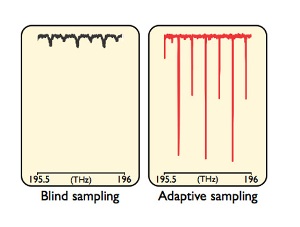Mar 3 2014
A team of scientists around Dr. Nathalie Picqué and Prof. Theodor W. Hänsch at the Laser Spectroscopy Division of the Max Planck Institute of Quantum Optics (Garching), in a collaboration with the Ludwig-Maximilians-Universität Munich and the Institut des Sciences Moléculaires d’Orsay (France) now reports on a new method of real-time identification and quantification of molecular species (Nature Communications 5, 3375 – Feb. 27, 2014).
 Fig.: Portion of a dual-comb real-time absorption spectrum of acetylene in the near-infrared region. While the spectrum without the adaptive sampling (blind sampling) is strongly distorted, the adaptive spectrum accurately reveals the molecular profiles. (Graphic: MPQ, Laser Spectroscopy Division)
Fig.: Portion of a dual-comb real-time absorption spectrum of acetylene in the near-infrared region. While the spectrum without the adaptive sampling (blind sampling) is strongly distorted, the adaptive spectrum accurately reveals the molecular profiles. (Graphic: MPQ, Laser Spectroscopy Division)
How to retrieve greenhouse gas concentrations in the earth atmosphere or to test fundamental laws of quantum mechanics? By measuring the spectrum of light interacting with matter, i.e. measuring the intensity of light transmitted through a medium as a function of its color. Each molecule leaves its fingerprint: characteristic absorptions, which make it possible to unambiguously identify it and measure its concentration. Recording an absorption spectrum that spans a broad spectral bandwidth in real-time (<1 millisecond) is an appealing quest to scientists working in this field: hundreds of molecules may then be simultaneously tracked. Research in chemical kinetics or homeland security gas detection would e.g. benefit from such capabilities.
In recent years, a new spectroscopic technique, called dual-comb spectroscopy, has demonstrated a very exciting potential for ultra-rapid recording of complex molecular spectra. Compared to the state-of-the-art instrumentation, Fourier transform spectroscopy, recording times could be shortened from seconds to microseconds. Dual-comb spectroscopy without moving parts harnesses two laser frequency combs, coherent sources that emit a regular train of ultrashort pulses, to perform interferometric measurements. However, the technique of dual-comb spectroscopy has not realized its full potential yet, mostly because it is difficult to synchronize the two comb lasers within the required precision. The MPQ scientists have now developed a new approach to adaptive sampling, so that they are able to use unstabilized free-running femtosecond lasers without sacrificing performance. By generating proper clock signals, they compensate for laser short-term instabilities by electronic signal processing only.
This demonstrated possibility of using femtosecond lasers without any sophisticated stabilization scheme considerably eases the implementation of a dual-comb spectrometer. “It should facilitate applications to real-time sensing,” comments Takuro Ideguchi, who just completed his doctoral dissertation, partly based on this experiment. “Dual-comb spectroscopy holds much promise for new approaches to molecular physics and our scheme of adaptive sampling is a key to their efficient implementation. Enhanced sensitivity for weak concentrations is within reach with the development of mid-infrared frequency combs, while nonlinear dual-comb spectroscopy provides intriguing prospects for applications ranging from bio-imaging to precision spectroscopy“, Takuro Ideguchi adds. [NP]
Original publication:
T. Ideguchi, A. Poisson, G. Guelachvili, N. Picqué and T.W. Hänsch
Adaptive real-time dual-comb spectroscopy
Nature Communications 5, Article number: 3375 (8 pages), Published 27 February 2014. DOI: 10.1038/ncomms4375
Contact:
Prof. Dr. Theodor W. Hänsch
Professor of Experimental Physics,
Ludwig-Maximilians-Universität, Munich
Director at Max-Planck-Institute of Quantum Optics
Hans-Kopfermann-Straße 1
85748 Garching, Germany
Phone: +49 (0)89 / 32 905 -712
E-mail: [email protected]
Dr. Nathalie Picqué
Max-Planck-Institute of Quantum Optics
Hans-Kopfermann-Straße 1
85748 Garching, Germany
Phone: +49 (0)89 / 32 905 -290
E-mail: [email protected]
Dr. Olivia Meyer-Streng
Press & Public Relations
Max-Planck-Institute of Quantum Optics
85748 Garching, Germany
Phone: +49 (0)89 / 32 905 -213
E-mail: [email protected]